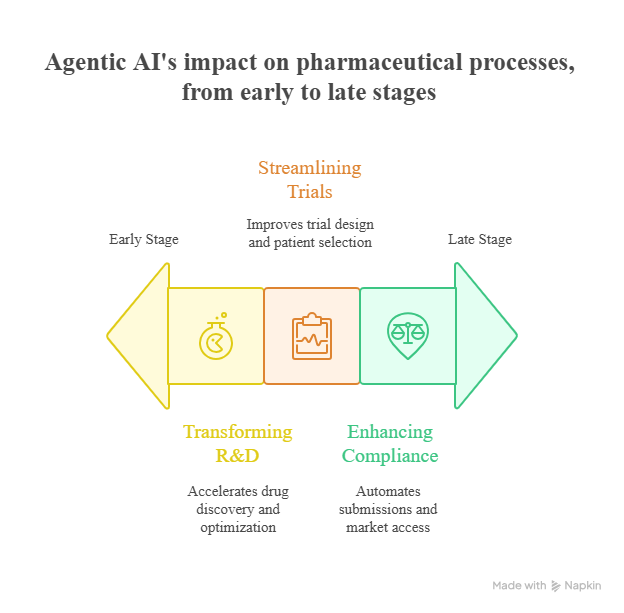The pharmaceutical industry is experiencing an unprecedented transformation driven by technological innovation and digital disruption. Among these technological advances, agentic Artificial Intelligence (AI) can reshape the drug development and commercialisation process. Agentic AI differs from traditional AI because the algorithms are autonomous and have decision-making ability, allowing it to do more sophisticated tasks, learn from new information, and improve processes in real-time.
This technological evolution holds the promise of radically speeding up drug discovery, optimising clinical trials, improving regulatory compliance and market access, all in a lower-cost and risk-reducing manner. As the sector is confronted with growing pressure to provide innovative medicines more efficiently and quicker, agentic AI presents a strong answer to address these challenges directly.
The Rise of Agentic AI in Pharma
The use of AI in pharma is not a futuristic reality but a current reality. However, there is a significant paradigm shift in transitioning from conventional AI to agentic AI. Traditional AI applications have been predominantly focused on data analytics, pattern recognition and predictive modeling. Agentic AI incorporates autonomy, adaptability and proactive decision making.
In drug discovery, for example, autonomous agentic AI systems are able to single-handedly discover lead molecular candidates, find the best synthesis paths, and even forecast possible safety concerns based on accrued data. This degree of automation not only shortens the R&D cycle but also improves the accuracy and quality of drug candidates.
Likewise, in clinical development, agentic AI can independently create adaptive trial protocols, choose best-in-class patient populations, and track trial progress in real-time, elastically changing parameters to achieve optimal efficacy and safety. This actively proactive strategy decreases the time and expense of conventional trial-and-error protocols.
The application of agentic AI stretches to manufacturing, regulatory compliance, and market access. To illustrate, regulatory intelligence platforms powered by AI can automatically read changing regulations across geographies, produce documentation, and drive approval processes. Agentic AI, when fully implemented, is an essential driver of innovation and efficiency in the entire pharma value chain.
Applications of Agentic AI in Pharma

-
Transforming R&D with Agentic AI
The early stages of drug development that includes target identification, validation, and lead optimisation are notoriously resource-intensive and time-consuming. Conventional pipelines can take more than a decade and span billions of dollars before a new treatment makes it to the market. Agentic AI radically reshapes this landscape by placing complex, data-intensive tasks in the hands of technology that have long depended on human input.
In target discovery, agentic AI is able to sort through enormous biological data sets, genomic data, and chemical libraries to discover new disease targets. It can develop hypotheses, validate targets, and rank candidates in order of potential therapeutic value through its own learning ability. Lead optimisation, another important stage in drug discovery, is enhanced by agentic AI’s ability to model molecular interactions, predict pharmacokinetics, and estimate toxicity, all with little human involvement. This iterative process, which once spanned years, can now be compressed into months, or even weeks.
Additionally, agentic AI provides an ongoing learning paradigm under which models improve continuously through continuous data acquisition from experimental outcomes, real-world data, and clinical inputs. This adaptive ability guarantees that the drug candidates are maximized for their efficacy, safety, and manufacturing, ultimately maximising the chances for success in subsequent trial stages.
-
Streamlining Clinical Trials with Agentic AI
Clinical trials are a critical bottleneck in bringing new therapies to market. They are complex and can be particularly slow and subject to failings of hundreds of factors that can impede timelines and outcomes. Agentic AI offers revolutionary approaches via adaptive trial designs which add more flexibility and responsiveness to new and emerging data.
The agentic AI is able to analyse patient data, genotype and biomarks autonomously and select suitable patients, estimate dropout risk and streamline trial endpoints. Its ability to dynamically modify key aspects of trial protocols in real time in response to interim findings minimises any exposure to sub-optimal treatments and expeditiously leads to clinical decision-making.
In addition to these capabilities an agentic AI system can oversee sites in real-time, monitor compliance, and indicate deviations in real-time as well as other adverse events. This real-time oversight offers enhanced patient safety, increased data integrity, and lowered operational costs.
Agentic AI also supports much smoother regulatory submissions through automatic preparation of documentation, data preparation, and validation of compliance with any region-specific standards. The result is an optimised workflow from the end of a study to regulatory approval with a substantial reduced time-to-market.
-
Enhancing Regulatory Compliance and Market Access
Change is also implicit in the regulatory environment and with agencies such as the FDA and EMA now progressing towards digital and data-driven frameworks around protocols. Agentic AI can also impose some order in this chaotic environment through independent interpretation of policies, risk assessment of compliance, and even regulatory submissions.
AI systems are capable of sifting through vast amounts of information about regulatory guidelines and organically ingesting new policies and drafting documents that satisfy local conditions. Employing automation speeds approval processes and reduces the risk of non-compliance fines.
Market access strategies are also benefiting from agentic AI’s capacity to simulate pricing models, health economics data, and payer requirements. Pharma companies can more closely align products with payers’ expectations and improve market uptake by independently optimising commercialisation plans.
The Future of Pharma with Agentic AI
The transition of agentic AI in pharma industry is a journey that will transform every phase of the pharma lifecycle. As technology evolves, so too will the abilities of agentic AI, extending to real world evidence analysis, personalised medicine, predictive maintenance of production assets, etc.
The way forward may involve AI acting as a collaborative partner to enhance human capacity rather than replace it. Together, it will create more innovative, patient-focused solutions and build a more resilient, agile industry that can react quickly to new health challenges.
In addition, the emergence of AI governance structures, ethical standards, and interoperability protocols will be crucial to the full exploitation of the potential of agentic AI so that it serves the interests of all the stakeholders while ensuring safety and transparency.
Conclusion
Agentic AI in pharma is undeniably set to redefine the pharmaceutical landscape, offering unprecedented efficiencies, enhanced decision-making capabilities, and a more patient-centered approach. From drug discovery to end-market launch and beyond, its adaptive and self-executing capabilities bring competitive advantage in an ever-growing, more complicated industry.
Pharma companies are embarking on a journey of operational transformation and innovation, powered by potentially the biggest technological revolution in a century. Although we are witnessing the digital era of pharma evolve and innovate, the future of pharma will not only be digital, but it will also be agentic, intelligent and collaborative. As agentic, intelligent and collaborative AI technologies evolve and improve with responsible governance, it’s transformational capabilities will ensure it is a permanent fixture in the pharma ecosystem for decades to come.
There is a journey ahead as we continue to explore the path to full agentic AI adoption by pharma, but the destination is clear. The vision ahead guides us to a world where medicines are produced faster, cheaper, and more tailored to individuals, with the promise of better health outcomes for the population across the globe. The era of agentic AI is here and it’s a consequential shift that will permanently change the pharma lifecycle for the better.























